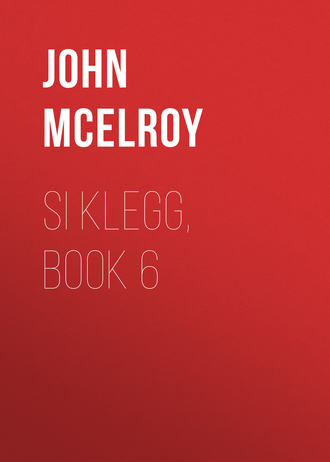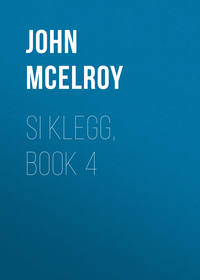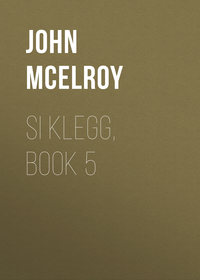 полная версия
полная версияSi Klegg, Book 6
"That's just what he was, the little runt, and we had the devil's own time finding him. What in Sam Hill did the Captain take him for, I'd like to know? Co. Q aint no nursery. Well, the bugler up at Brigade Headquarters blowed some sort of a call, and Skidmore wanted to know what it meant. They told him that it was an order for the youngest man in each company to come up there and get some milk for his coffee tomorrow morning, and butter for his bread. There was only enough issued for the youngest boys, and if he wanted his share he'd have to get a big hustle on him, for the feller whose nose he'd put out o' joint 'd try hard to get there ahead o' him, and get his share. So Skidmore went off at a dead run toward the sound of the bugle, with the boys looking after him and snickering. But he didn't come back at roll-call, nor at tattoo, and the smart Alecks begun to get scared, and abuse each other for setting up a job on a poor, innocent little boy. Osc Brewster and Ol Perry, who had been foremost in the trick had a fight as to which had been to blame. Taps come, and he didn't get back, and then we all became scared. I'd sent Jim Hunter over to Brigade Headquarters to look for him, but he came back, and said they hadn't seen anything of him there. Then I turned out the whole company to look for him. Of course, them too-awfully smart galoots of Co. A had to get very funny over our trouble. They asked why we didn't get the right kind of nurses for our company, that wouldn't let the members stray out of their sight? Why we didn't call the children in when the chickens went to roost, undress 'em, and tuck 'em in their little beds, and sing to 'em after they'd said 'Now I lay me down to sleep?' I stood it all until that big, hulking Pete Nasmith came down with a camp-kettle, which he was making ring like a bell, as he yelled out, 'Child lost! Child lost!' Behind him was Tub Rawlings singing, 'Empty's the cradle, baby's gone.' Then I pulled off my blouse and slung it into my tent, and told 'em there went my chevrons, and I was simply Scott Ralston, and able to lick any man in Co. A. One o' their Lieutenants came out and ordered them back to their quarters, and I deployed the company in a skirmish-line, and started 'em through the brush toward Brigade Headquarters. About three-quarters o' the way Osc Brewster and Ol Perry, when going through a thicket, heard a boy boo-hooing. They made their way to him, and there was little Skidmore sitting on a stump, completely confused and fagged out. He'd lost his way, and the more he tried to find it the worse he got turned around. They called out to him, and he blubbered out: 'Yes, it's me; little Pete Skidmore. Them doddurned fools in my company 've lost me, just as I've bin tellin' 'em right along they would, durn 'em.' Osc and Ol were so tickled at finding him that they gathered him up, and come whooping back to camp, carrying him every step of the way."
"Well, I declare to gracious," ejaculated Si. "But there's one left yet. Didn't anything happen to Sandy Baker?"
"O, yes," groaned the Orderly. "He had to be in it, too. He took advantage of the tumult to fall into the company well. We didn't know anything about it till we come back from hunting Skidmore. By that time he was so chilled that he could hardly holler any more, and his teeth chattered like a nigger minstrel's bones. I'd got a can of brandied peaches down at the sutler's, and it took all the brandy to bring him around, and I had nothing left but the peaches. Now, while I like a little variety in camp-life as well as the next man, I don't want no more ructions like last night's. I'll put you in charge of those kids, and hold you responsible for 'em. I don't care what you do with 'em, so long's you keep 'em quiet, and don't disturb the company. Kill 'em, if you want to, but keep 'em quiet. I've got to finish up them pay-rolls tonight."
"You bet me and Shorty'll stop these smart Alecks from imposin' on the poor little greenies," asserted Si.
CHAPTER VI. SI KLEGG PUTS HIS AWKWARD SQUAD THROUGH ITS FIRST DRILL
"I GUESS," thought Si, as he left the Orderly-Sergeant, and walked down the company street to the left, "that the best way to begin is to get them little whelps into an awkward squad, and give 'em an hour or two o' sharp drillin'. That'll introduce 'em to the realities o' soljerin'."
It was a warm, bright March day, with the North Georgia mountains rapidly robing themselves in fresh green, to welcome the coming Spring. The effervescent boys had entirely forgotten the worries of the previous night, and were frolicking in the bright sunshine as if "out-at-recess" from school.
Mackall, Joslyn, Humphreys and Baker had gotten hold of a ball, and were having a game of "two-cornered cat," with noise enough for a whole school play-ground. Russell and Scruggs were running a foot-race, for the entertainment of a squad of cooks and teamsters, and little Pete Skidmore was giving an exhibition before the same audience of his ability to stand on his head, and turn somersaults.
"Little thought they have of the seriousness of war," thought Si, with a shrug of his shoulders, as he yelled out:
"Come, boys, fall in here."
When the boys had first come under Si's command they regarded him as one of the greatest men in the army. In their shadowy notions of military matters they rather thought that he stood next to the great Generals whose names filled all mouths. These ideas had been toppled into dust by their arrival in camp, and seeing so many different men order him around. They felt ashamed of themselves that they had ever mistaken him for a great man, and put him up on a pedestal. That is the way with boys. They resent nothing more sharply than the thought of their having been deceived into honoring somebody or something unworthy of honor. They can stand anything better than a reflection upon their shrewdness and judgment.
"Hear Klegg a-calling?" said Joslyn, pausing for an instant, with the ball in his hand.
"Let him call," said Mackall, indifferently, finishing his run to base. "He ain't big boss no more. He's only the lowest Sergeant in the company. Throw the ball, Harry. You must do better'n you've been doing. We're getting away with you."
"Fall in here, boys, I tell you," said Si so sternly that Pete Skidmore stopped in his handspring, but seeing the bigger boys making no move to obey, decided that it would be improper for him to show any signs of weakness, and he executed his flip-flap.
"Here, you're out, Gid. Gi' me the bat," shouted Harry Joslyn, as he caught the ball which Mackall had vainly struck at.
Si strode over to the group, snatched the bat from Harry's hand, spanked him with it, and started for the others of the group.
"Say, you musn't hit that boy," exclaimed Gid, jumping on Si's back. Gid was as ready to fight for Harry as to fight with him. The others rushed up, school boy like, to defend their companion against "the man," and little Pete Skidmore picked up a stone and adjusted it for throwing.
"Why, you little scamps you," gasped Si in amazement. "What'd you mean? Ain't you goin' to obey my orders?"
"You haint no right to give us orders no more," asserted Humphreys, flourishing his bat defiantly. "You're only an enlisted man, same as the rest o' us. They told us so, last night, and that we mustn't let you impose on us, as you'd bin doin'. Only the Captain and the Colonel command us. We've bin posted. And if you dare hit any o' us we'll all jump on you and maul your head offen you."
The rest looked approval of Jim's brave words.
"We're goin' to strike for our altars and our fires. Strike for the green graves of our sires. God and our native land," declaimed Monty Scruggs.
The waspish little mutiny was so amusing that Si had to smile in spite of himself. With a quick, unexpected movement he snatched the bat from Jim Humphreys' hand, and said good-humoredly:
"Now, boys, you mustn't make fools of yourselves agin'. Stop this nonsense at once, I tell you. I'm just as much your commandin' officer as I ever was."
"How can you be a commanding officer, when everybody else bosses you about?" persisted the argumentative Monty Scruggs. "Everybody that comes near you orders you around, just the same as you used to us, and you mind 'em. That ain't no way for a commanding officer. We don't want anybody bossing us that everybody else bosses."
"Well, that's the way o' the army," Si explained patiently, "and you've got to git used to it. 'Most everybody bosses somebody else. The President tells Gen. Grant what he wants done. Gen. Grant orders Gen, Thomas to do it. Gen. Thomas orders a Major-General. The Major-General orders a Brigadier-General. The Brigadier-General orders our Colonel. Our Colonel orders Cap McGillicuddy. Cap McGillicuddy orders the Orderly-Sarjint, the Orderly-Sarjint orders me, and I command you."
"Why, it's worse'n 'The-House-That-Jack-Built,'" said Monty Scruggs.
"Well, you needn't learn all of it," said Si. "It's enough for you to know that I command you. That's the A B C of the business, and all you need know. A man in the army gits into trouble offen by knowin' too much. You git it well into your craws that I command you, and that you've got to do just as I say, and I'll do the rest o' the knowin' that you need.—"
"But how're we to know that you're right every time," argued Monty Scruggs.
"Well," explained the patient Si, "if you've any doubts, go to the Orderly-Sarjint. If he don't satisfy you, go to the Captain. If you have doubts about him, carry it to the Colonel. If you're still in doubt, refer it to the Brigadier-General, then to the Major-General, to Gen. Thomas, Gen. Grant, and lastly to the President of the United States."
"Great goodness!" they gasped.
"But the less you bother your heads with Captains and Curnels and Generals the better you'll git along. The feller that's right over you—in arm's length o' you all the time—is the feller that you've got to look out for sharply. I'm him. Now I want you to form in two ranks quicker'n scat, and 'tend to business. I'm goin' to drill you. Gid Mackall, take your place there. Harry Joslyn, stand behind him."
The old squabbles as to precedence immediately broke out between Gid and Harry, which Si impatiently ended by snatching Harry by the collar and yanking him behind Gid, with the wrathful Harry protesting that he intended carrying the matter up through the whole military hierarchy, even to the President of the United States, if necessary. He did not come into the army to be run over.
"You came into the army to do just as I tell you, and you'll do it. Silence in the ranks," commanded Si. "Humphreys, stand next to Mackall. Scruggs, stand behind Humphreys."
"Why do you put one man behind another?" queried Monty Scruggs. "I don't think that's right.—Jim's big head'll be forever in my way, so's I can't see anything. Why don't you put us out in one line, like a class in school? Then everybody's got the same show."
"I didn't make the tactics. Git into your places," snapped Si.
"Well, I don't think much of a teacher that can't explain what he's teaching," mumbled Monty, as he reluctantly obeyed.
"Now, Russell, stand next to Humphreys; Baker, stand behind Russell; Skidmore, stand next to Russell."
"Goody, I'm in the front rank," giggled little Pete, and Harry Joslyn looked as if here was another case of favoritism that he would have to call the President's attention to.
"Now," commanded Si, "put your heels together, turn your toes out, stand erect, draw your stomachs in—"
"Look here, Jim Humphreys," grumbled Monty Scruggs, "when he told you to draw your stomach in he didn't mean for you to stick your hips out till you bumped me over into the next Township. I've got to have room to stand here, as well as you."
"Silence in the ranks," commanded Si. "Draw your stomachs in, put your little fingers down to the seams of your pantaloons—"
"You mean the middle finger, don't you?" queried Monty Scruggs. "That's more natural way of standing."
"No, I mean the little finger," asserted Si.
"But the middle finger is more natural," persisted Monty. "You can't stand straight with your little finger at the seam. See here."
"Scruggs, do as I say, without no words," said Si, and then Monty's face took on an expression of determination to carry the matter to a higher court.
"Now, keep your faces straight to the front, and at the command 'Right dress!' turn your eyes, without moving your heads, until you kin see the buttons on the breast of the second man to the right. 'Right dress!'"
"There's no man on my right for me to look toward. What 'm I to do?" complained Gid Mackall.
"There, you see what come o' putting him in front," exulted Harry Joslyn. "Now, if I'd bin—"
"Say, I can't see up to Jim Humphreys' big breast without twistin' my neck nearly off," murmured little Pete Skidmore. "Can't you make him scrooch a little? Jest see him swell up."
"What's the use o' linin' on a feller that can't stand still a second?" complained the others.
"Great Scott, what a line," groaned Si, walking along, shoving the boys back, and twisting them around, to get them straight. "Crooked as a pumpkin vine in a cornfield. Here, I told you not to turn your heads, but only your eyes. If you snipes wouldn't gab so much, but listen to what I say, you'd git along better. Silence in ranks. Now, try it over again. Faces straight to the front. Eyes cast to the right, until they catch the buttons on the breast of the second man. Right dress!"
"Great grief," sighed he, looking at the result. "You wriggle about like so many eels. Might as well try to line up so many kittens. Won't you straighten Up and keep straight?" Then came a renewal of the noisy discussion, with mutual blaming of one another.
Si picked up a stick and drew a line in the ground. "Now bring your toes to that line, and keep 'em there."
"Shall we take that scratch along with us as we march, or will you draw another one for us as we need it?" Monty Scruggs asked, at which the other boys laughed, which did not improve Si's temper. It was long, hard work before he got the restless, talkative young fellows so that they would form a fairly straight line, and maintain it for a minute or two.
He looked at them, wiped his perspiring brow, and remarked internally:
"Well, I thought them was bright boys, that it'd be no trouble to drill. I'd ruther break in the stoonidest lot o' hayseeds that ever breathed, rather than boys that think they know more'n I do. Now I'm goin' to have the time o' my life learnin' 'em the right face."
He began the explanation of that complicated manuver:
"Now, I want every one o' you to stop talkin', gether up them scatter-fire brains o' your'n, and pay strict 'tention to every word I say—"
"Harry Joslyn," broke in Gid, "if you tramp on my heels just one more time, I'll knock your head off. I've told you often enough."
"Well, you just keep off en my toes with them rockgrinders o' your'n," Harry retorted.
"Silence in ranks," commanded Si. "Each rank will count twos."
"What are twos? Where are they, and how many of 'em do you want us to count?" asked Monty Scruggs, at which the other boys snickered. They were getting very tired of the drill, and in the humor to nag and balk the drillmaster. Si lost a trifle of his temper, and said:
"You're too all-fired smart with your tongue, Scruggs. If you were only half as smart learnin' your business—"
"Sergeant," said one of the Lieutenants who happened to be passing, "keep your temper. You'll get along better. Don't squabble with your men."
This made the boys much worse.
"What I mean by countin' twos," explained Si, "is that the man on the right in each rank shall count one, the next one, two; the next one, one and so on. Count twos!"
They made such an exasperating muddle of it, that Si almost had a fit. The cooks, teamsters and other hangers-on saw the trouble and came flocking around with all manner of jesting remarks and laughter, which strained Si's temper to the utmost, and encouraged the boys in their perversity. Si curbed himself down, and laboriously exemplified the manner of counting until the boys had no excuse for not understanding it.
"Now, said he, at the command 'Right face,' the No. 1 man in the front rank faces to the right and stand fast—"
"What do the rest of us do?" they chorused.
"The rest o' you chase yourselves around him," said a humorist among the cooks, while the others laughed uproariously.
"Shut up, you pot-wrastlers," said Si wrathfully. "If I hear another word from you, I'll light into you with a club. Now you brats—"
"Sergeant," admonished the Lieutenant, "you mustn't use such language to your men."
This made Si angrier, and the boys more cantankerous. Si controlled himself to go on with his explanations in a calm tone:
"No 1 in the front rank will face to the right, and stand fast, and take a side step to the right. Each No. 2 will face to the right, and take on oblique side step to the right to place himself on the right hand of his No. 1 man."
"Say that all again, Sergeant," asked Monty Scruggs.
Si patiently repeated the explanation.
"Now sing it to the tune of 'When this Cruel War is Over,' called out the cook-humorist.
"Right face," commanded Si.
A roar went up from the camp-follower audience at the hopeless tangle which ensued. No two of the boys seemed to have done the same thing. Several had turned to the left, and all were sprinting around in various ways in a more or less genuine pretense of executing the order. Meanwhile the news that Si's squad of recruits were having fun with him spread through the camp, and a crowd gathered to watch the performance and give their jeering advice in that characteristic soldierly way when they see a comrade wrestling with a perplexing job.
"Git a bushel basket, and gather 'em up in it."
"Tie straw around their left feet, and hay around their right ones, so's they'll know 'em."
"Back 'em up agin' a rail fence and git 'em into line;" were among the freely offered suggestions. Si was sweating all over, and so angry that he had to stolidly bite his words off, one at a time, to keep from showing his temper. To add to his troubles, he saw the Colonel, of whom he stood in proper awe, become interested in the crowd and the shouting, and stroll down from his tent to see what the excitement was.
"As you were," Si commanded, steadying his voice with a great effort. "Every one of you git back as I placed you. Right dress!"
To his wonderment they formed as good a line as veterans could have done. They heard a whisper that the Colonel was coming, and it sobered them.
"Right face!" commanded Si.
They all faced to the right and stepped into their places without an error.
"Front!" commanded Si, and they returned to two ranks.
"Ah, Sergeant," said the Colonel, kindly, as he made his way through the respectfully opened, saluting crowd. "Giving your men their first drill, are you? Well, you are getting along remarkably well for recruits. I saw that last movement, and it was very well done, indeed. You've got some very nice-looking boys there, and I think they'll be a credit to the regiment."
"Saved by the skin o' my teeth," gasped Si to himself, as the Colonel strolled on. "Now, you young roosters, I see that you kin do it whenever you want to, and you've got to want to after this. A boy that don't want to I'll take down to the branch there, and hold his head under water till he does want to. I'm goin' to stay with you until you learn the drill dead letter perfect. You can't git rid of me. You'll save trouble by rememberin' that. Now we'll go back for supper. Right face—forward—file left—March!"
CHAPTER VII. SHORTY'S HEART TURNS TOWARD MARIA
AND HE FINALLY GETS A LETTER FROM HERAFTER the flush of excitement of returning to his old regiment and meeting his comrades—after the process of readjusting himself to the changed relations made by death, wounds, discharges, resignations and promotions—after the days had brought a settling back into the old routine of camp-life, there developed in Shorty's heart growing homesickness for Maria Klegg.
At least that was what it seemed to him. He did not exactly know what homesickness was from personal experience, as he had never really had a home. But he had seen thousands of boys more or less affected by that obscure but stubborn and dangerous malady, and had noted their symptoms, which strongly resembled his own.
Somehow, the sun only shone with real brightness and warmth over the pleasant homes and fertile fields of Posey County, Ind. Somehow, women had a fairness and sweetness there denied to their sex elsewhere, and somehow the flower of them all was a buxom maiden of 20 dwelling under the roof of Deacon Klegg.
Shorty appreciated very properly the dignity and responsibilities of his two stripes. He was going to be the model Corporal of the regiment, and give all the rest a copy which they could follow to advantage. Of all the Corporals he had ever known, Si Klegg had come nearest his ideas as to what a Corporal should be, but even Si had his limitations. He would show him some improvements. So shorty bent his mind upon the performance of everything pertaining to the Corporalcy with promptness and zeal. He even set to studying the Regulations and Tactics—at least those paragraphs relating to Corporals and their duties—where heretofore he had despised "book-soldiering," and relied on quick observation and "horse sense" to teach him all that was worth knowing. But his stay in the Deacon's home showed him that they esteemed "book-knowledge" even in common things as of much value, and he began to have a new respect for that source of instruction.
Even through the pressure of official duties and responsibilities there would steal, like the wafting of a sweet song to the ears of the reapers in a hot field, thoughts of the coolness, the beauty and the peace of that quiet home on the Wabash, with one flower-faced girl, with white, soft arms, going about her daily tasks, singing with such blithe cheeriness that even the birds stopped to listen to a sweeter note than theirs. Some subtle fragrance from her seemed to be with him wherever he was, and whatever he might be doing. When, as the tallest Corporal in Co. Q, he stood on the right of the company, on drill and dress parade, and made the others "dress" on him, he wished that Maria Klegg could only see how straight the line was, and how soldierly the boys looked. When the Colonel personally selected him to command the squad which was to escort the Paymaster through a dangerous part of the country, he would have given much had Maria known of the trust reposed in him. And when, as Corporal of the Guard, he suppressed in his usual summary way a noisy row among the teamsters and cooks, he was very glad that Maria did not hear the remarks that a Corporal always thinks necessary to make on such occasions. Shorty did not swear with the fluent ease of before his visit to the Klegg homestead, but a little excitement gave the old looseness to his tongue. And when he sat around the guard-fire, he would refuse to be drawn into any "little games," but turn his back upon the chattering crowd, and furtively draw from his breast-pocket the remnant of Maria's dress, and feel it, and muse over it, until aroused by the call:
"Corporal of the Guard, Post No. 14. I want a drink o' water."
Shorty began to watch for Si's mail a good deal more anxiously than that worthy did. He managed to go by the Chaplain's tent whenever duty took him in that part of the camp, and sometimes when it did not, and inquire if there was any mail there for Si. One day he was rewarded by the Chaplain handing him two letters. His heart beat a little quicker by seeing that they were both postmarked Bean Blossom Creek. The smaller—a white envelope, superscribed in Annabel's cramped little hand—he thrust indifferently into his pocket, and the larger—a fat, yellow envelope, covered with the good Deacon's massive crow-tracks, and securely fastened by a dab of sealing wax, pressed down with a cent—he studied with tender interest. It had come directly from her home—from her father. It probably told something about her.
It seemed as if there was something of the perfume of her presence about it. Possibly she had carried it to the station and mailed it. He turned it over gently, studied every detail, and fixed his eyes upon it, as if he would make them pierce the thick, strong paper and devour the contents. Then it occurred to him that the better and quicker way to get at the inside would be to deliver the letters to Si. So he hunted up his partner, whom he found about to take his squad out for a turn at wagon guarding.









